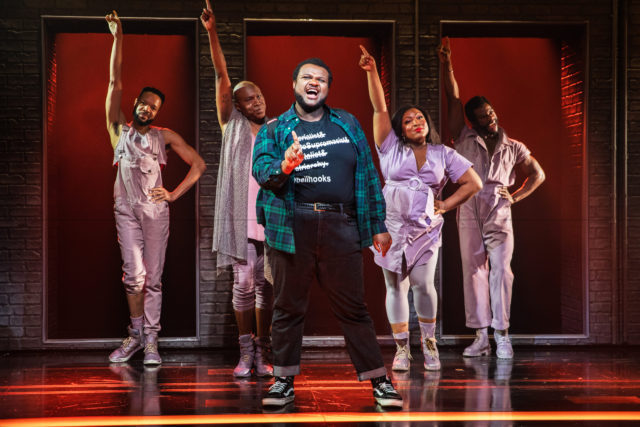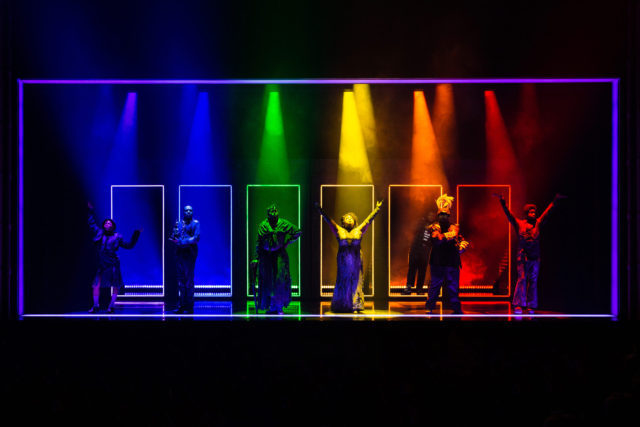
Jaquel Spivey makes his Broadway debut in Pulitzer Prize–winning musical A Strange Loop (photo by Marc J. Franklin)
A STRANGE LOOP
Lyceum Theatre
149 West 45th St. between Sixth & Seventh Aves.
Tuesday – Sunday through January 15, $49 – $225
strangeloopmusical.com
In his 2007 book I Am a Strange Loop, Pulitzer Prize–winning scientist Douglas Hofstadter writes, “In the end, we are self-perceiving, self-inventing, locked-in mirages that are little miracles of self-reference.” In her song “Strange Loop” from her seminal 1993 debut album Exile in Guyville, Liz Phair sings, “The fire you like so much in me / Is the mark of someone adamantly free. . . . I can’t be trusted / They’re saying I can’t be true / But I only wanted more than I knew.”
Hofstadter and Phair are among those who served as major influences on Michael R. Jackson’s dazzling, Pulitzer Prize–winning musical, A Strange Loop, which is bringing down the house at the Lyceum on Broadway following an earlier run at Playwrights Horizons. As the show opens, the protagonist, Usher (Jaquel Spivey), is ushering the audience back to their seats for the second act of The Lion King, adding some unexpected bonus information: “In the background, there will be a young overweight-to-obese homosexual and/or gay and/or queer, cisgender male, able-bodied university-and-graduate-school educated, musical theater writing, Disney ushering, broke-ass middle-class politically homeless normie leftist black American descendant of slaves who thinks he’s probably a vers bottom . . . but not totally certain of that obsessing over the latest draft of his self-referential musical A Strange Loop! And surrounded by his extremely obnoxious Thoughts!” Usher later explains that his self-referential musical is “about a black, gay man writing a musical about a black, gay man who’s writing a musical about a black gay man, who’s writing a musical about a black gay man, etc.”
To bring the loop full circle, Jackson himself is a young overweight homosexual who has been obsessing over his self-referential musical, A Strange Loop, for nearly twenty years; it started off as a monologue in 2003, written when Jackson was working as an usher on Broadway for The Lion King and other Disney extravaganzas and listening to “dat-blasted white girl music” by Phair, Tori Amos, and Joni Mitchell.

Six thoughts come to colorful life at the Lyceum Theatre (photo by Marc J. Franklin)
Usher’s never-ending fears and worries come to life in the form of six thoughts that roil around in his brain and comment on his decisions like a Greek chorus, including Supervisor of Your Sexual Ambivalence (L. Morgan Lee), Daily Self-Loathing (James Jackson Jr.), Head of Corporate Niggatry (Jason Veasey), and Financial Faggotry (Antwayn Hopper); it’s like a queer Black version of the 1990s cis white sitcom Herman’s Head, in which a young magazine employee’s thoughts of professional and romantic success are debated by four actors playing various parts of his psyche. The actors portraying Usher’s thoughts also take turns as his mother (John-Andrew Morrison), father (Veasey), agent (John-Michael Lyles), and various historical Black figures.
Usher is haunted by his consciousness, especially when he is given the opportunity to ghost write a gospel play for Tyler Perry. Usher feels that writing for Perry would compromise everything he believes in, calling Perry “toxic” and arguing, “The crap he puts on stage, film, and TV makes my bile wanna rise.” However, his thoughts and family want him to do it for the money and because “Tyler Perry writes real life” and “Tyler Perry loves his mama.” The guilt runs deep as Usher pursues both professional and personal opportunities, desperate to make himself seen and heard in a world that too often treats him as if he’s invisible, what he refers to as his “exile in Gayville.” Although not all of the details in the show are autobiographical, Jackson shares a lot in common with Usher, except now everyone knows who Jackson is.
A Strange Loop is stylishly directed by Stephen Brackett (Be More Chill, The Lightning Thief) with a balls-out sense of humor that is furthered by Raja Feather Kelly’s wickedly sly choreography, which has fun with Spivey, who is not your typical Broadway leading man. Arnulfo Maldonado’s set isolates Usher, making his loneliness palpable, while giving each Thought its own doorway, like the different compartments of the brain. Montana Levi Blanco’s costumes are highlighted by Usher’s red usher outfit, which is counteracted by his black T-shirt that includes such crossed-out words as “Imperialist” and “White Supremacist” above the clearly legible “bell hooks,” a tribute to the Black author and activist (Black Is . . . Black Ain’t, I Am a Man: Black Masculinity in America) who passed away in December 2021 at the age of sixty-nine.
The ninety-minute show looks and sounds terrific, with colorful lighting by Jen Schriever, vibrant sound by Drew Levy, music direction by Rona Siddiqui, and wonderful orchestrations by Charlie Rosen, played live by a six-piece band. In his Broadway debut, Spivey, taking over for Larry Owens, who played Usher in the off-Broadway production, is an utter delight. From the opening moments, when he declares, “Everyone, please return to your seats; the second act is about to begin!” to his later acknowledgment that “These are my memories / Sweet sour memories / This is my history / This is my mystery,” he has the audience firmly on his side. You don’t have to be a queer Black man to identify with Usher’s fears and desires, to understand his loneliness. Jackson has done a masterful job of making A Strange Loop an inclusive story while also challenging conceptions of what a Broadway musical can be; this is not The Lion King or Aladdin, and it is most certainly not for kids.
In Gödel, Escher, Bach: An Eternal Golden Braid, Hofstadter writes, “The self comes into being at the moment it has the power to reflect itself.” A Strange Loop works because it reflects on itself, and on all of us, in one way or another.